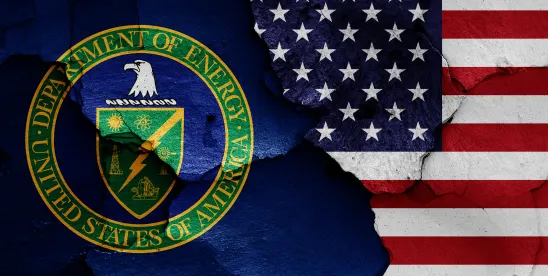On May 12, 2025, the U.S. Department of Energy (DOE) announced a proposal to streamline the application process for authorizations to transmit electricity from the United States to other countries (e.g., Canada and Mexico).[1] At the same time, DOE issued a “direct final rule” rescinding its regulations regarding applications for presidential permits “authorizing construction, connection, operation, and maintenance of facilities for transmission of electric energy at international boundaries.”[2] Taken together, these actions, if implemented as proposed, likely will make it faster, easier, and less expensive for companies to access cross-border markets and reduce their attendant regulatory obligations, including reporting requirements. Comments on the Proposed Rule will be due on or about July 15, 2025 (60 days from expected publication in the Federal Register). The Final Rule will take effect on the same date unless DOE receives “significant adverse comments”[3] within 30 days of publication.
These actions comprise part of what DOE calls its “largest deregulatory effort in history, proposing the elimination or reduction of 47 regulations that are driving up costs and lowering quality of life for the American people.”[4] DOE claims that, overall, the changes “will save the American people an estimated $11 billion and cut more than 125,000 words from the Code of Federal Regulations.”[5] Indeed, the Proposed Rule would reduce the relevant regulations from approximately 1,300 words spanning nine sections to just one 85-word section that would empower applicants to include only such information in their filings that they “deem[] relevant” to the requested authorization under the Federal Power Act (FPA), with DOE exercising a “strong policy in favor of approving applications, and doing so quickly and expeditiously.”[6]
Citing President Trump’s Executive Order (EO) 14154 (Unleashing American Energy) and EO 14192 (Unleashing Prosperity Through Deregulation), DOE states that it is rescinding the cross-border facility regulations and proposing to amend the export authorization regulations because they “impose economic, administrative and procedural burdens” that “impede private enterprise and entrepreneurship and run contrary to the President’s goal of unleashing American energy.”[7]
The export authorization regulations flow from Section 202(e) of the FPA, which provides that “no person shall transmit any electric energy from the United States to a foreign country without first having secured an order of [DOE] authorizing it to do so.”[8] It continues that DOE “shall issue” such approval orders “upon application unless, after opportunity for hearing, it finds that the proposed transmission would impair the sufficiency of electric supply within the United States or would impede or tend to impede the coordination in the public interest of facilities” subject to its jurisdiction.[9]
DOE proposes to amend those regulations “to reduce burden and remove out of date requirements while simultaneously bolstering American energy dominance by increasing [electricity] exports and subsequently the reliance of foreign nations on American energy.”[10] The amended regulations “will simply allow applicants to include information the applicant deems relevant to such an authorization for consideration by the DOE” under the FPA.[11] Specifically, 10 C.F.R. § 205.300 would be amended to read, in full: “To obtain authorization to transmit any electric energy from the United States to a foreign country, an electric utility or other entity subject to DOE jurisdiction under part II of the Federal Power Act must submit an application or be a party to an application submitted by another entity. The application shall include information the applicant deems relevant to DOE’s determination under section 202(e) in the Federal Power Act. DOE has a strong policy in favor of approving applications, and doing so quickly and expeditiously.”[12]
In the Final Rule, DOE states that because the authority for presidential permits for cross-border transmission facilities “rests in Executive Order, it is at the discretion of the Executive branch as to how the order is applied.”[13] Accordingly, DOE states, it is rescinding the relevant regulations for the same reasons—namely, to reduce burdens, remove outdated requirements, bolster American energy dominance by reducing barriers to constructing cross-border facilities, and increase exports and foreign reliance on American energy.[14]
DOE seeks comment from interested parties on “all aspects” of both issuances, including on the prior rules’ “consistency with statutory authority and the Constitution [and] national security, whether the prior rules are out of date, the prior [rules’] costs and benefits, and the prior [rules’] effect[s] on small business, entrepreneurship and private enterprise.”[15]
While DOE regularly grants export authorizations, the streamlined application and authorization process, if adopted as proposed, would make obtaining such authorizations easier and less expensive and could provide sellers seeking broader market opportunities greater access to markets in Canada and Mexico. Moreover, elimination of the presidential permit requirement for cross-border transmission facilities, if finalized as proposed, will reduce the administrative burden on entities seeking to develop such facilities, further enhancing access to foreign markets. The energy regulatory team at Foley will continue to monitor developments in this area. Please feel free to contact us with any questions.
[1] Application for Authorization to Transmit Electric Energy to a Foreign Country, 90 Fed. Reg. _____ (unpublished version dated May 12, 2025) (to be codified at 10 C.F.R. pt. 205) (the “Proposed Rule”).
[2] Application for Presidential Permit Authorizing the Construction, Connection, Operation, and Maintenance of Facilities for Transmission of Electric Energy at International Boundaries, 90 Fed. Reg. _____ (unpublished version dated May 12, 2025) (to be codified at 10 C.F.R. pt. 205) (the “Final Rule”).
[3] According to DOE, “significant adverse comments” are those that “oppose the rule and raise, alone or in combination, a serious enough issue related to each of the independent grounds for the rule that a substantive response is required. If significant adverse comments are received, notice will be published in the Federal Register before the effective date either withdrawing the rule or issuing a new final rule which responds to significant adverse comments.” Final Rule at 1.
[4] U.S. Dept. of Energy, Energy Department Slashes 47 Burdensome and Costly Regulations, Delivering First Milestone in America’s Biggest Deregulatory Effort, https://www.energy.gov/articles/energy-department-slashes-47-burdensome-and-costly-regulations-delivering-first-milestone (May 12, 2025) (“DOE Press Release”).
[5] Id.
[6] Proposed Rule at 10.
[7] Final Rule at 2.
[8] 16 U.S.C. § 824a(e) (2018). This authority moved to DOE from the Federal Energy Regulatory Commission under Sections 301(b) and 402(f) of the DOE Organization Act, 42 U.S.C. §§ 7151(b) and 7172(f).
[9] 16 U.S.C. § 824a(e).
[10] Proposed Rule at 3.
[11] Id.
[12] Id. at 10.
[13] Final Rule at 3.
[14] Id.
[15] Proposed Rule at 3; Final Rule at 3.





 />i
/>i
